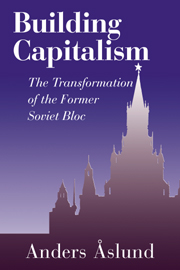Book contents
- Frontmatter
- Contents
- List of Tables and Charts
- Acknowledgments
- List of Abbreviations
- Introduction
- 1 What Communism Actually Was
- 2 The Decline and Fall of Socialism
- 3 Strategic Policy Choices
- 4 Changes in Output and Their Causes
- 5 Liberalization
- 6 Financial Stabilization
- 7 Privatization
- 8 Social Developments and Policy
- 9 State and Politics in the Transformation
- 10 Role of the Outside World
- 11 Conclusions
- Bibliography
- Index
11 - Conclusions
Published online by Cambridge University Press: 15 September 2009
- Frontmatter
- Contents
- List of Tables and Charts
- Acknowledgments
- List of Abbreviations
- Introduction
- 1 What Communism Actually Was
- 2 The Decline and Fall of Socialism
- 3 Strategic Policy Choices
- 4 Changes in Output and Their Causes
- 5 Liberalization
- 6 Financial Stabilization
- 7 Privatization
- 8 Social Developments and Policy
- 9 State and Politics in the Transformation
- 10 Role of the Outside World
- 11 Conclusions
- Bibliography
- Index
Summary
A decade is a sufficiently long period to breed clear perceptions, but too brief to offer true answers. The views of the extent of success of the transformation vary with country of focus, observations, and prior expectations of the observer, but a broad spectrum ranging from great success to utter failure is evident. The key question is why some countries have done so much better than others.
The main problem has been rent seeking harming economic performance. Some states have successfully checked it, while others have succumbed, getting stuck in cumbersome underreform traps. Shock therapy has been a much derided label of radical systemic reform, usually applied by its enemies, but shocks have been vital for the success of transition. The current situation is far from satisfactory, but numerous factors can harbor positive changes, while the threats seem fewer.
HOW FAR HAS TRANSFORMATION PROCEEDED?
Reformers aimed at building stable democracies and dynamic market economies, based on private ownership and good governance, able to deliver sustained economic growth. Table 11.1 summarizes the achievements. In most regards, the same countries have succeeded, and the same countries have failed, and a clear subdivision arises.
The focal point was building a market economy, and we have chosen a certain value of the structural reform index as a benchmark (see Table 5.1). Fourteen of our 21 countries, including the whole of East-Central Europe, Moldova, Armenia, Georgia, Kazakhstan, and Kyrgyzstan, comply with this standard, but our benchmark is not an absolute qualitative indicator, and Russia and Ukraine were close.
- Type
- Chapter
- Information
- Building CapitalismThe Transformation of the Former Soviet Bloc, pp. 441 - 456Publisher: Cambridge University PressPrint publication year: 2001



